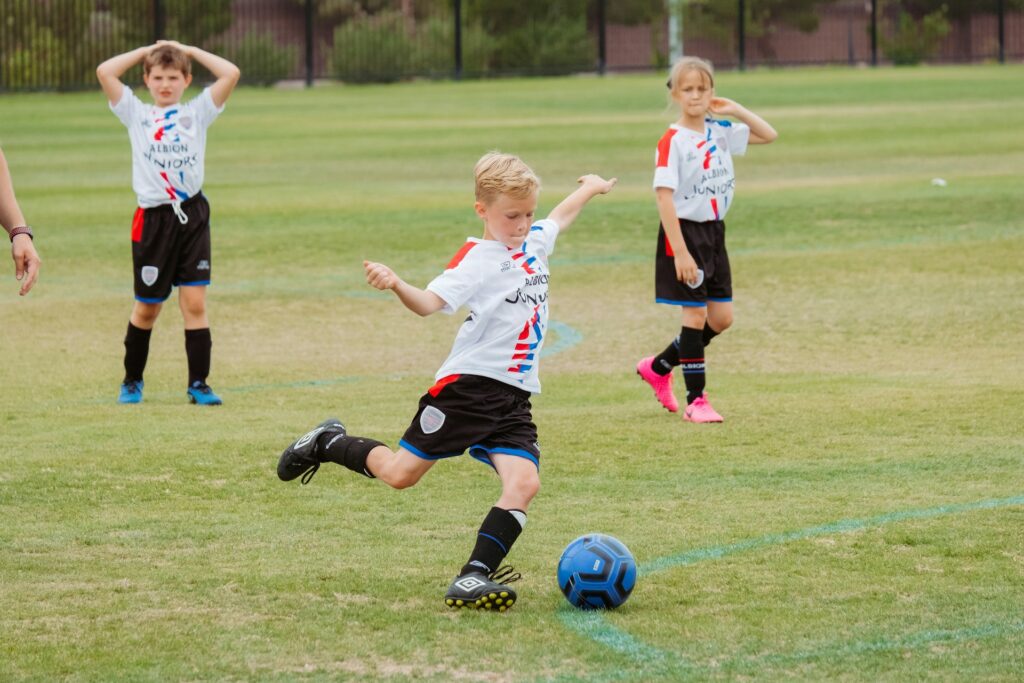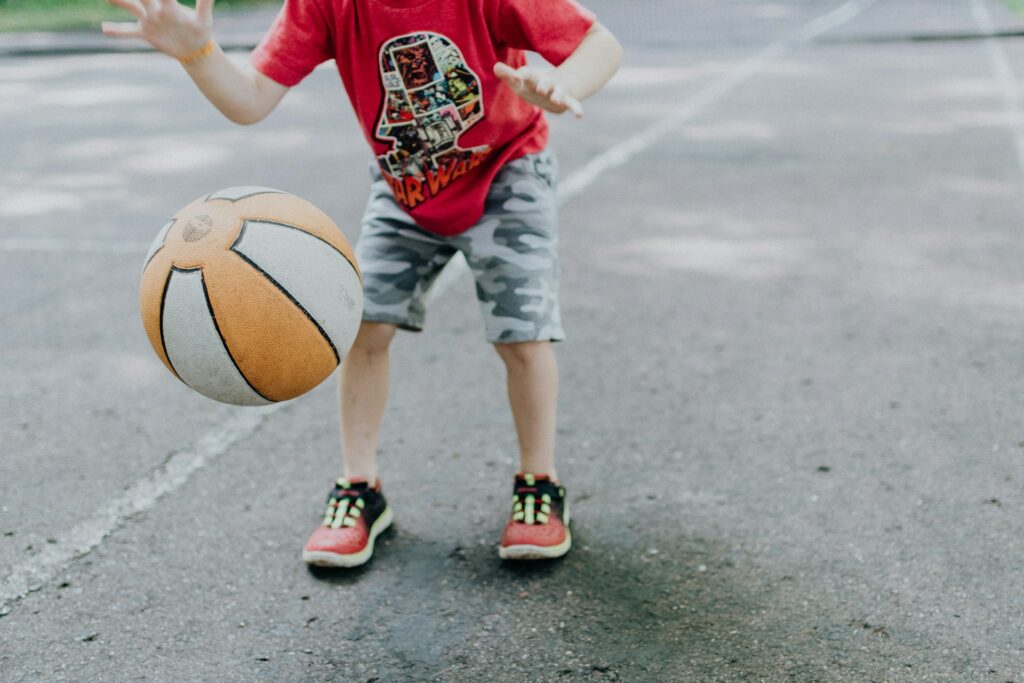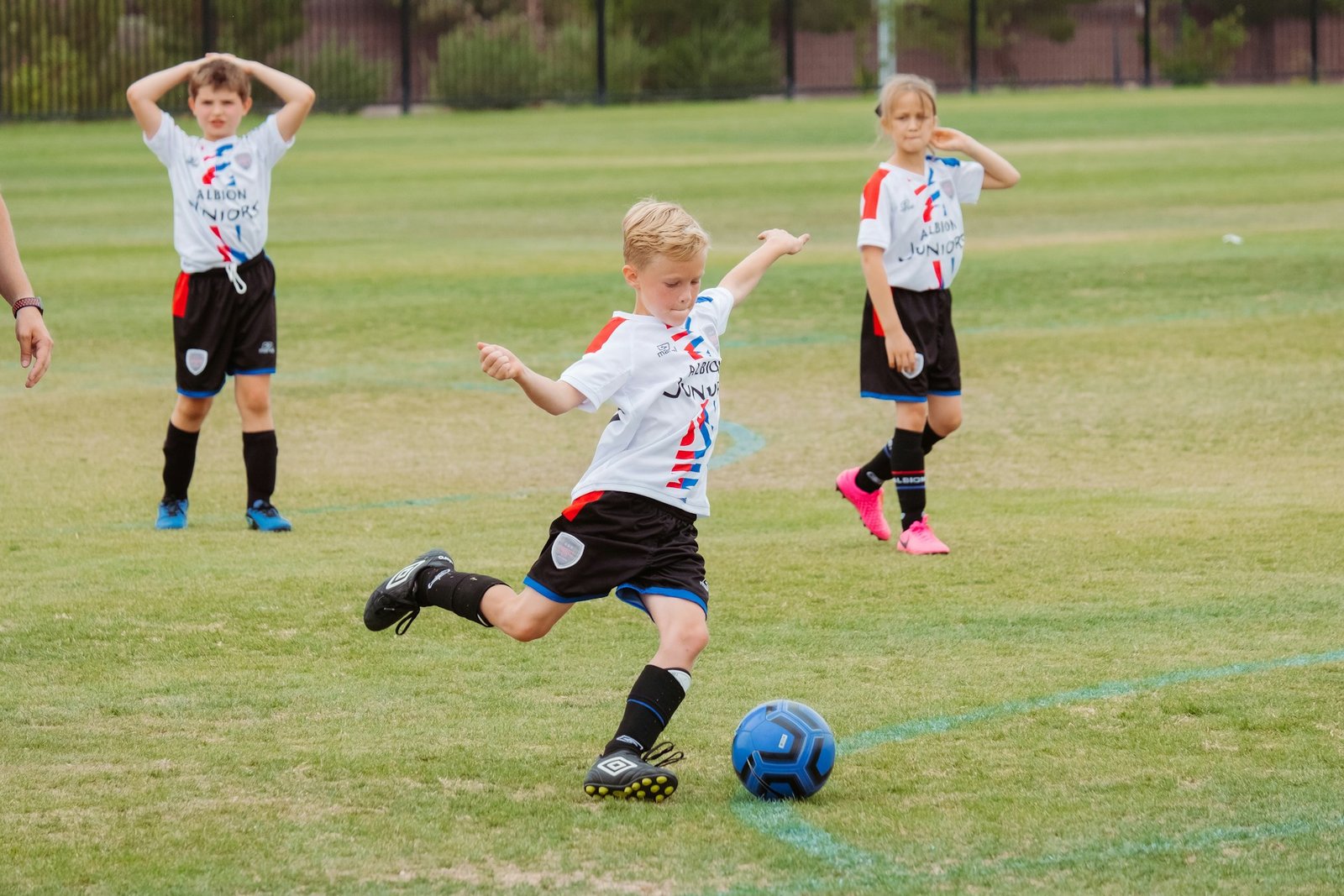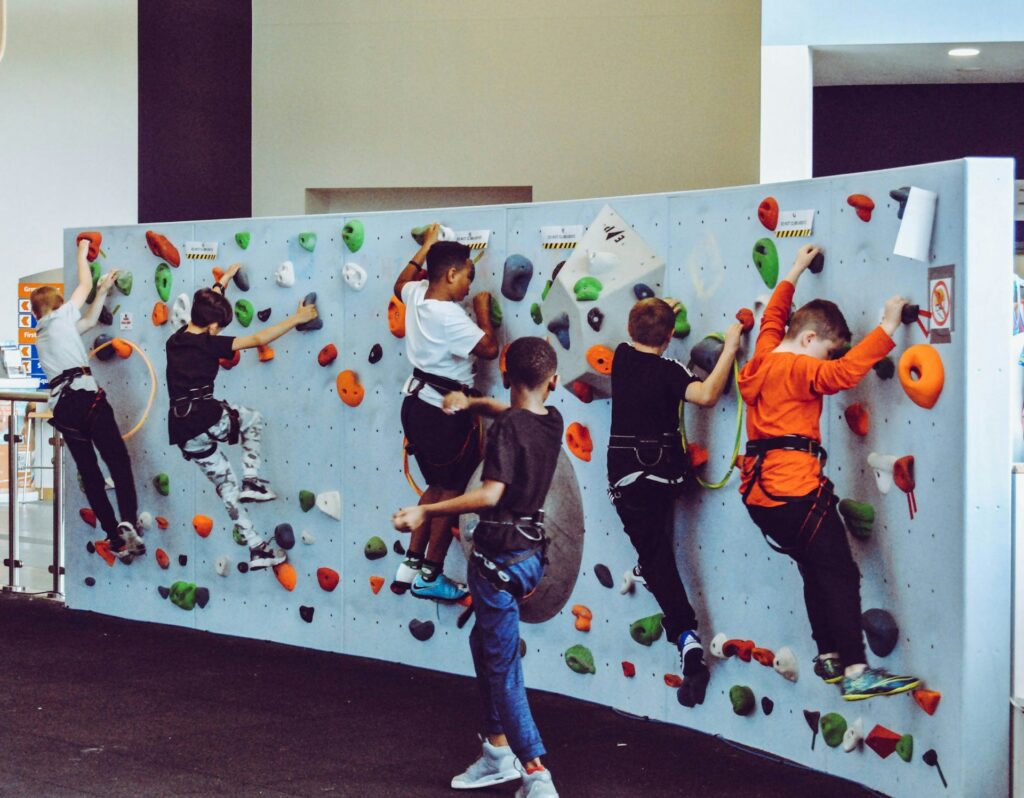Participating in sports offers children a well-rounded set of benefits that extend beyond physical health. Engaging in regular sports activities helps develop critical life skills, such as teamwork, leadership, and resilience.

Photo by Kenny Eliason on Unsplash
It also fosters social connections, allowing children to build friendships and learn how to work collaboratively with others. Mentally, sports can enhance focus, discipline, and emotional regulation, providing a healthy outlet for stress and anxiety.
The combination of physical activity, mental challenge, and social interaction makes sports a vital component of a child’s overall well-being.
Physical Health Benefits of Sports
Improving cardiovascular fitness is one of the most significant physical health benefits of sports, as regular participation in activities like running, swimming, and cycling strengthens the heart and boosts overall endurance.
Enhancing Cardiovascular Fitness
Sports that involve running, jumping, and continuous movement significantly improve cardiovascular fitness in children. Activities like soccer, basketball, and swimming elevate heart rate, strengthen the heart muscle, and improve circulation.
Regular participation in these sports helps reduce the risk of developing heart-related conditions later in life.
Building Strength and Coordination
Strength and coordination are critical aspects of physical development in children. Sports like basketball and martial arts emphasize muscle strengthening through activities that require jumping, throwing, and controlled movements.
These sports also enhance hand-eye coordination, balance, and spatial awareness. Building strength through sports not only supports healthy growth but also helps prevent injuries by improving muscle and joint stability.
Mental and Emotional Advantages
Boosting self-esteem and confidence is a key mental and emotional advantage of sports participation, as regular involvement in physical activities helps children achieve personal milestones, gain recognition from peers and coaches, and build a positive self-image.

Photo by Kelly Sikkema on Unsplash
Boosting Self-Esteem and Confidence
Engaging in sports can have a profound impact on a child’s self-esteem and confidence. Achieving goals, whether it’s scoring a goal in soccer or mastering a swimming technique, provides a sense of accomplishment that boosts self-worth.
Positive reinforcement from coaches, teammates, and parents further enhances a child’s confidence. Over time, the resilience developed through overcoming challenges in sports translates into a stronger belief in one’s abilities, both on and off the field.
Reducing Stress and Anxiety
Sports offer a productive outlet for managing stress and anxiety in children. Physical activity stimulates the release of endorphins, the body’s natural mood elevators, which help reduce feelings of stress.
Structured environment of team sports provides a sense of routine and stability, which can be comforting for children. The social support found in sports teams also plays a crucial role in alleviating anxiety, as children learn to rely on their peers and coaches for encouragement and guidance.
Popular Sports for Kids
Let’s see some specific sports, starting with soccer, which is known for fostering teamwork and building endurance.
Soccer: Teamwork and Endurance
Soccer is one of the most popular sports for children, offering numerous benefits beyond physical fitness. The sport emphasizes teamwork, as players must work together to achieve a common goal—scoring.
This collaboration teaches children the importance of communication, cooperation, and strategizing with others. Soccer also builds endurance, as the continuous running involved in the game significantly improves cardiovascular health.
And playing soccer enhances agility, coordination, and gross motor skills, making it a well-rounded physical activity.
Soccer also promotes mental toughness. The fast-paced nature of the game requires quick thinking and decision-making, helping children develop cognitive skills under pressure.
Soccer teaches valuable life lessons such as handling wins and losses gracefully, maintaining sportsmanship, and setting personal and team goals.
Basketball: Coordination and Agility
Basketball is another excellent sport for children, known for enhancing coordination and agility. The game requires precise hand-eye coordination to dribble, pass, and shoot the ball, all while moving quickly around the court.
This combination of skills development promotes both fine and gross motor skills. Basketball also improves reflexes and reaction times, as players must constantly adjust their movements in response to the dynamic nature of the game.
Physically, basketball is a full-body workout. It builds muscle strength, particularly in the legs, core, and upper body, through actions like jumping, sprinting, and shooting.
Basketball fosters social interaction and teamwork, as players learn to work together, communicate effectively, and support each other on and off the court. Mentally, the sport teaches discipline, focus, and the importance of strategy, making it an excellent activity for holistic development.
Pickleball: Fun and Easy for All Ages
Pickleball is a rapidly growing sport that combines elements of tennis, badminton, and ping-pong, making it an enjoyable and accessible activity for children of all ages. The smaller court size and slower-paced ball make it easier for young players to learn and enjoy the game, while still providing a good workout.
Pickleball improves hand-eye coordination, agility, and balance, as players must react quickly to the ball and move around the court.
The social aspect of pickleball is one of its standout benefits. The game is often played in doubles, promoting teamwork and communication among players.
It’s also a highly inclusive sport, where children of different skill levels can play together, fostering a sense of community and sportsmanship. Pickleball is not only fun but also encourages physical activity in a way that feels accessible and engaging for kids.
Swimming: Full-Body Fitness and Safety Skills
Swimming is a vital skill and sport that offers comprehensive physical benefits for children. As a full-body workout, swimming engages all major muscle groups, improving strength, flexibility, and endurance.

Photo by Mario Heller on Unsplash
The resistance of water provides a low-impact exercise environment, making it ideal for building muscle tone without straining joints.
Swimming is highly effective in enhancing cardiovascular health and lung capacity, contributing to overall fitness.
Beyond the physical benefits, swimming teaches essential safety skills that can be life-saving. Learning to swim equips children with the confidence and ability to navigate water environments safely. The discipline required in swimming, such as following instructions and maintaining proper form, also contributes to mental development.
Swimming also has a calming effect, helping to reduce stress and promote relaxation. It’s a sport that not only keeps children physically active but also instills a lifelong skill that promotes safety and well-being.
Martial Arts: Discipline and Focus
Martial arts, such as karate, taekwondo, and judo, are excellent for teaching children discipline, focus, and respect.

Photo by Jyotirmoy Gupta on Unsplash
The structured environment of martial arts classes instills a sense of order and discipline, as children learn to follow instructions, practice self-control, and respect their instructors and peers. Martial arts also enhance concentration and focus, as techniques require precision and mental engagement.
Physically, martial arts build strength, flexibility, and coordination. The repetitive practice of kicks, punches, and forms improves muscle tone and joint mobility, while also enhancing reflexes and balance.
Mentally, martial arts provide a constructive outlet for energy and stress, promoting emotional regulation and resilience.
The emphasis on personal growth, rather than competition, helps children develop self-confidence and a strong sense of personal responsibility. Martial arts offer a holistic approach to physical and mental well-being, making them a valuable addition to any child’s routine.
Encouraging a Lifelong Love of Physical Activity
To cultivate a lifelong love of physical activity in children, it’s essential to make sports fun and engaging, ensuring that they associate exercise with enjoyment and personal growth.
How to Make Sports Fun for Kids
Making sports enjoyable for children is key to fostering a lifelong love of physical activity. Focus on creating a positive and supportive environment where the emphasis is on fun and personal improvement rather than competition.
Incorporate games, challenges, and variety to keep their interest piqued. Celebrate effort and progress, no matter how small, to build confidence and enthusiasm. Ensuring that kids are having fun will keep them engaged and eager to participate in sports regularly.
Involving the Whole Family in Active Play
Family involvement in sports can make physical activity more enjoyable and meaningful for children. Organize family-friendly activities like bike rides, hiking, or playing games together in the park.
Participating as a family not only promotes physical fitness but also strengthens family bonds and sets a positive example for children. When children see their parents and siblings being active, they are more likely to develop a positive attitude toward physical activity and make it a regular part of their lives.
Overcoming Challenges in Youth Sports
Overcoming challenges in youth sports often begins with addressing the pressure to win, which can overshadow the enjoyment and personal growth that sports are meant to provide for children.
Addressing the Pressure to Win
The pressure to win can take the joy out of sports for children. It’s important to shift the focus from winning to personal development, effort, and enjoyment. Encourage children to set personal goals that are not solely outcome-based, such as improving a skill or trying their best in every game.
Coaches and parents should emphasize the value of teamwork, sportsmanship, and learning from mistakes. By reducing the emphasis on winning, children can enjoy sports more and develop a healthy attitude toward competition.
Ensuring Safe and Inclusive Participation
Safety and inclusivity are paramount in youth sports. Ensure that all children, regardless of their ability level, have the opportunity to participate in sports in a safe and supportive environment.
This includes providing proper equipment, following safety guidelines, and creating an atmosphere where everyone feels welcome.
Coaches and parents should be aware of the individual needs of each child, adapting activities to ensure that everyone can participate fully and safely. An inclusive environment fosters a sense of belonging and encourages continued participation in sports.
The Long-Term Impact of Active Play on Well-Being
Active play and sports provide children with the foundation for a healthy and balanced life. The physical benefits, such as improved fitness and strength, are complemented by mental and emotional growth.
Through sports, children learn discipline, perseverance, and resilience—qualities that are valuable in all areas of life. The social skills gained from teamwork and communication help build strong relationships, while the habit of regular physical activity lays the groundwork for a lifelong commitment to health and well-being.
By participating in sports, children are better equipped to lead fulfilling, balanced lives.


 Photo by
Photo by